Transmission Replacement LH2
Removal Procedure
- Raise and support the vehicle. Refer to Lifting and Jacking the Vehicle in General Information.
- Remove the exhaust system. Refer to Exhaust System Replacement in Engine Exhaust.
- Remove the rear propeller shaft. Refer to Rear Propeller Shaft Replacement in Propeller Shaft.
- Remove the transfer case if equipped. Refer to Transfer Case Assembly Replacement in Transfer Case - BW 4476.
- Disconnect the shift linkage from the transmission. The linkage may be on the right or left side of the transmission depending on the application. Refer to Shift Control Linkage Replacement .
- Disconnect the transmission wiring harness connector (1) from the transmission by rotating the locking latch counterclockwise.
- Disconnect the wiring harness retainers from the transmission, and position the wiring harness aside.
- Remove the front air deflector. Refer to Front Air Deflector Replacement in Body Front End.
- Remove the transmission fluid cooler lines form the plastic cooler line retainer bracket.
- Place an oil drain pan under the transmission fluid cooler pipes.
- Remove the transmission fluid cooler pipes from the transmission, and position aside. Refer to Transmission Fluid Cooler Pipe Replacement - Rear .
- Remove and discard the O-rings. Do NOT reuse the O-rings.
- Plug the open outlet ports to prevent fluid loss and contamination.
- Remove the transmission close out plug.
- Mark the torque converter to flexplate/flywheel orientation to ensure proper realignment.
- Pull the torque converter bolt close out cover upper retaining pin downward unlocking it from the engine block.
- Remove the torque converter bolt close out cover from the engine block.
- Repeat the following steps for all 3 torque converter bolts:
- Remove the front differential heat shield and bracket if equipped. Refer to Shield Replacement in Front Drive Axle.
- Using the transmission jack. Lower the engine and transmission assembly only enough to gain access to the upper 2 transmission mounting bolts.
- Position the engine wiring harness out of the way.
- Remove the transmission vent hose from the transmission vent tube.
- Remove the upper 2 bolts.
- Using the transmission jack. Raise the engine and transmission assembly to the normal position.
- Place a support stand under the rear of the engine oil pan to keep the engine level while removing the transmission.
- Remove the lower 8 transmission mounting bolts.
- Pull the transmission free from the engine dowels (1).
- Separate the transmission from the engine approximately 25.4 mm (1 in) to clear the starter drive nose cone.
- Carefully lower the transmission from the vehicle.
- Flush the transmission oil cooler. Refer to Transmission Fluid Cooler Flushing and Flow Test .
Important: NEW torque converter bolts and cooler pipe O-rings will be required each time the transmission is removed and installed.
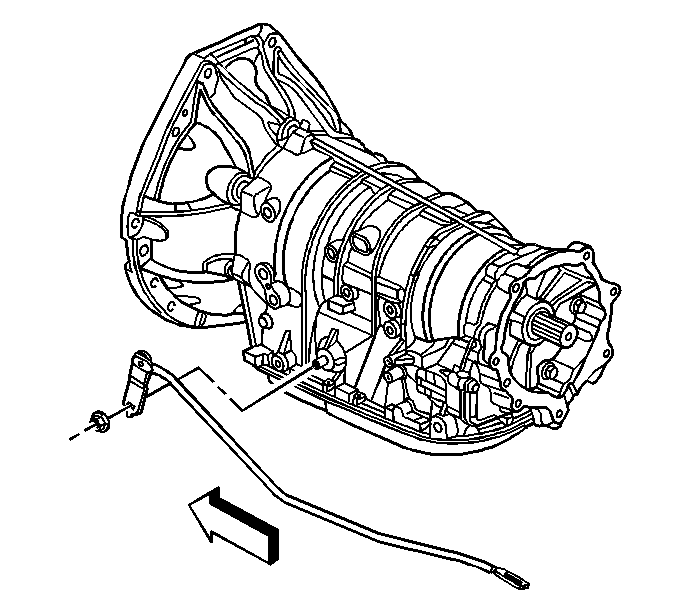
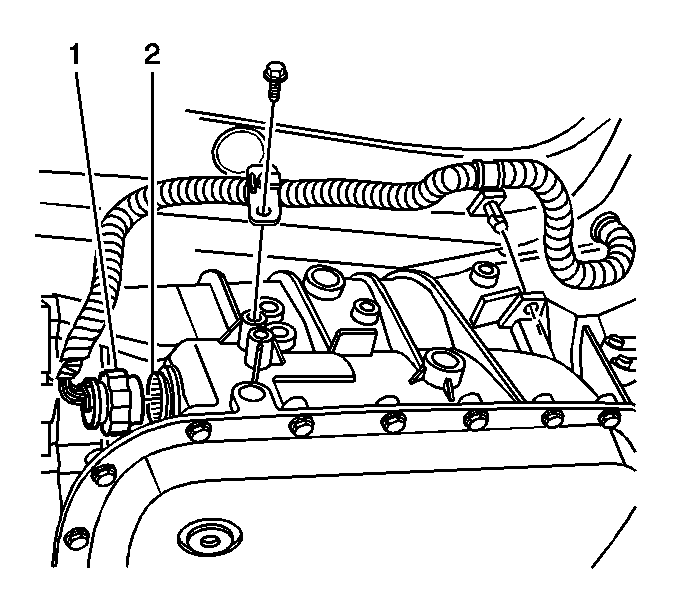
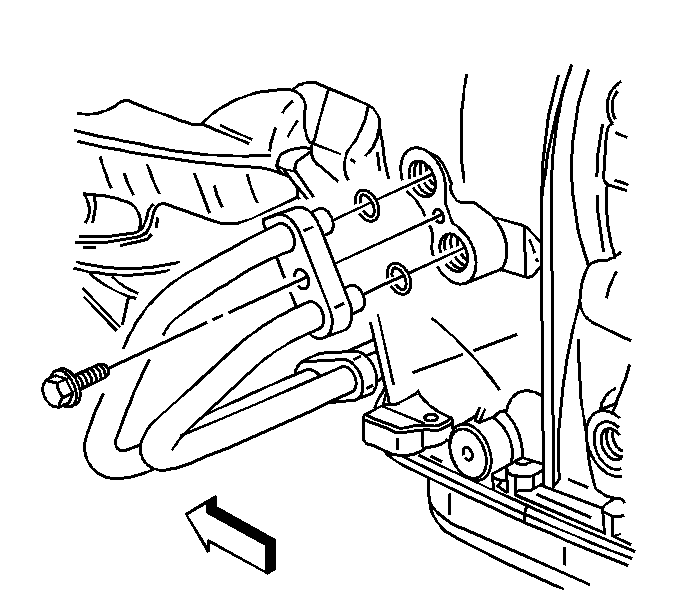
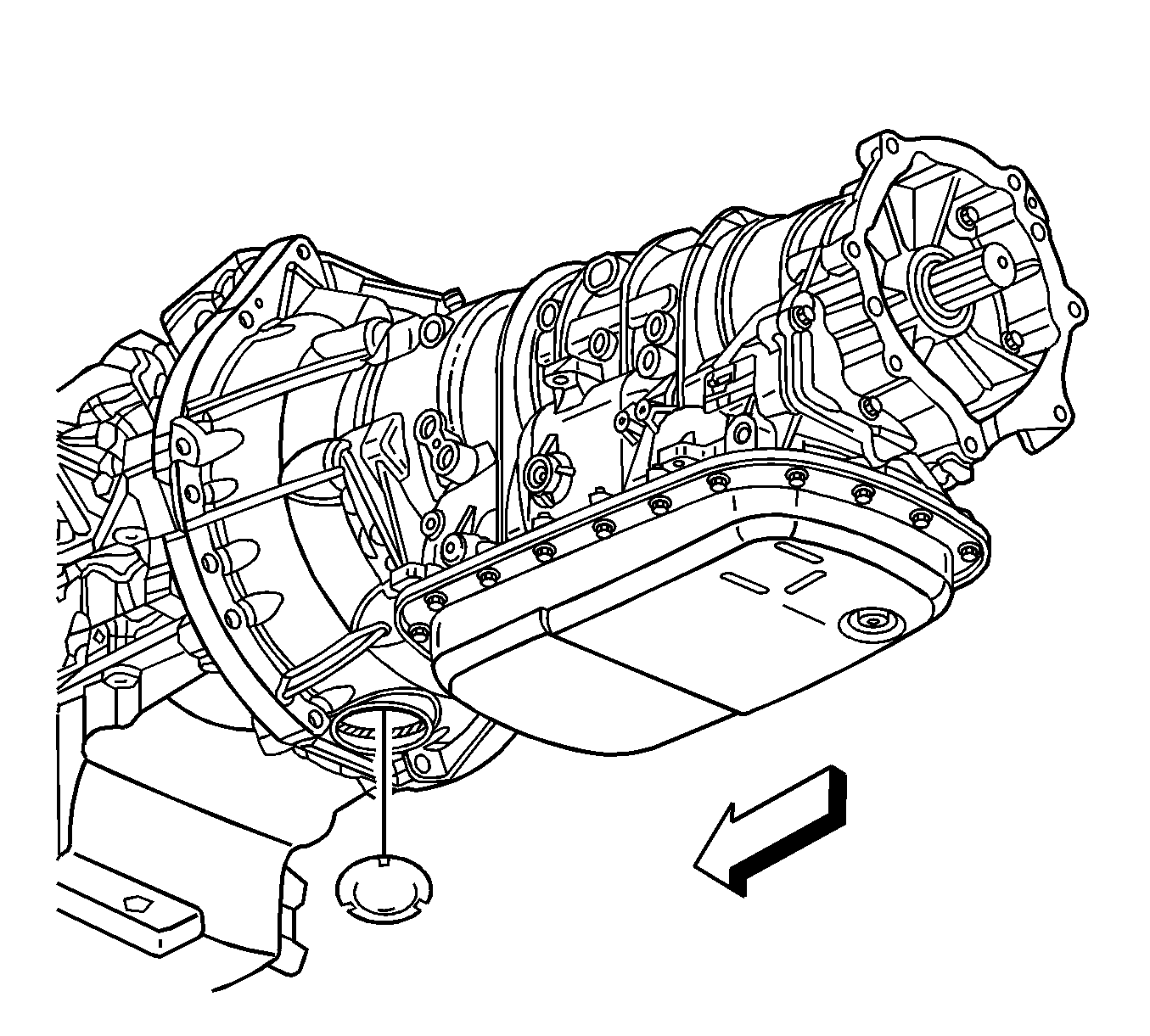
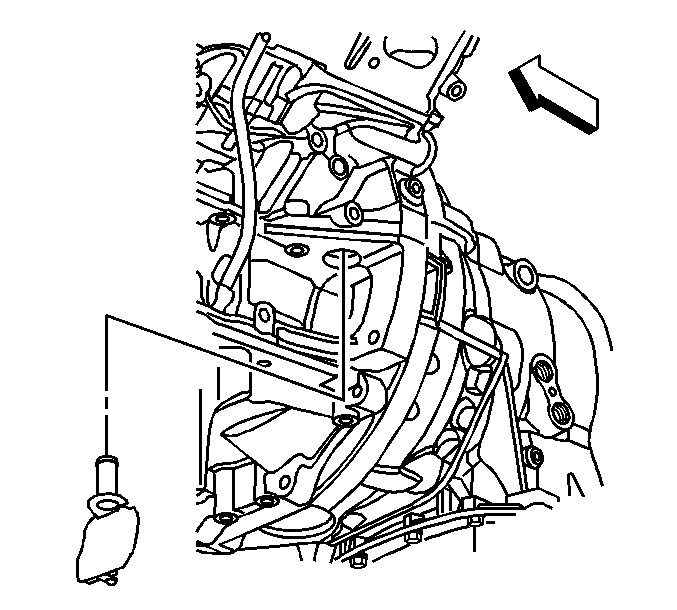
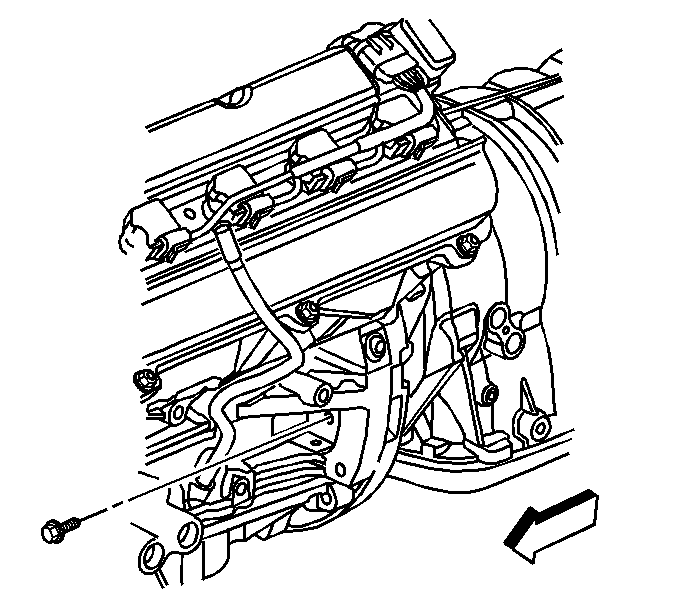
| 18.1. | Rotate the harmonic balancer center bolt or fan adapter, depending on the application, clockwise ONLY, in order to align the torque converter bolt with the access hole. |
| 18.2. | Remove and discard the torque converter bolt. The bolt is self locking and is NOT reusable. |
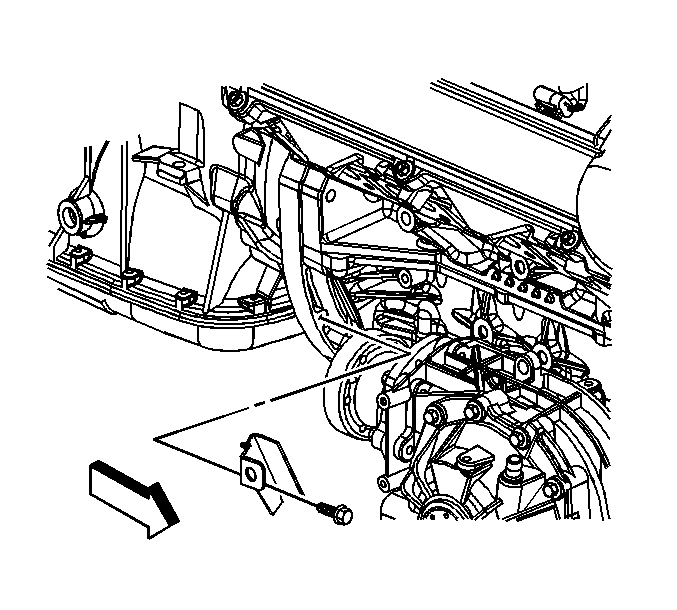
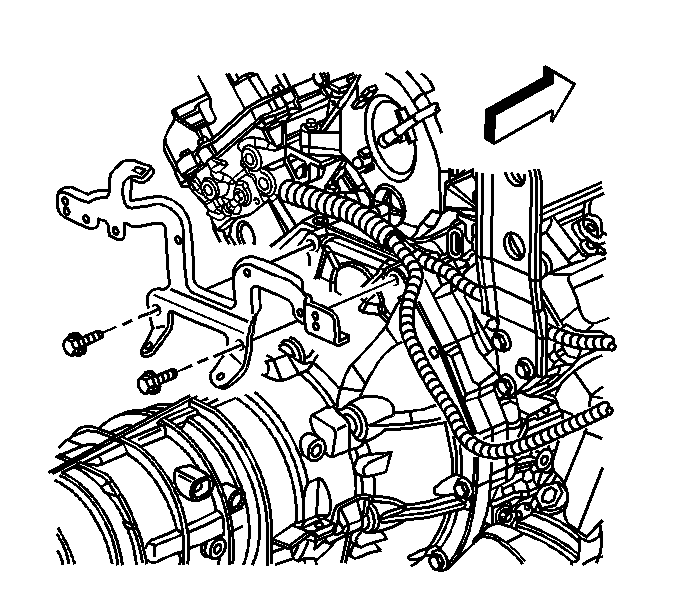
Important: Be careful to NOT allow the front differential drive pinion flange, if equipped, to come in contract with power steering rack while lowering the transmission.
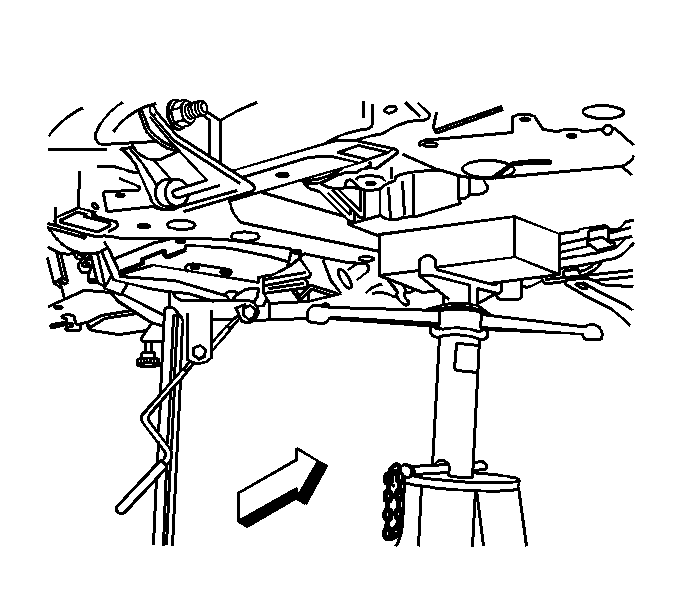
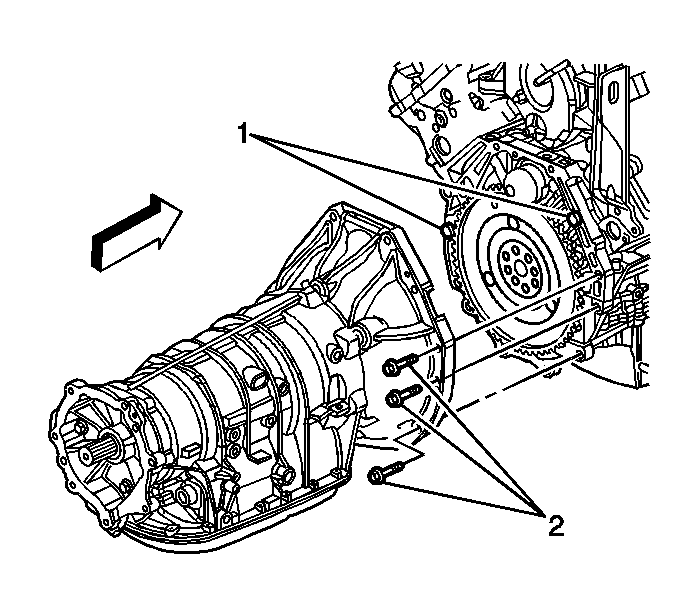
Important: Ensure clearance is maintained between the transmission and the following:
• The starter drive nose cone • The catalytic converters • The oxygen sensors • The wiring harnesses • The cooler pipes
Installation Procedure
- Using the transmission jack, carefully raise the transmission to meet the engine.
- Align the transmission with the engine dowels (1).
- Install the lower 8 transmission mounting bolts.
- Remove the support stand from under the engine oil pan.
- Using the transmission jack. Lower the engine and transmission assembly only enough to gain access to the upper transmission bolt locations.
- Install the upper transmission mounting bolts.
- Install the transmission vent hose to the transmission vent tube.
- Position the engine wiring harness to the original location.
- Install the transfer case if equipped. Refer to Transfer Case Assembly Replacement in Transfer Case - BW 4476.
- Align the torque converter to flexplate/flywheel orientation marks made during the removal procedure.
- Complete the following steps for all 3 torque converter bolts:
- Install the torque converter bolt close out cover to the engine block.
- Push the torque converter bolt close out cover upper retaining pin upward locking it into the engine block.
- Install the transmission close out plug.
- Place NEW O-rings over the transmission fluid cooler pipes.
- Install the transmission fluid cooler pipes to the transmission. Refer to Transmission Fluid Cooler Pipe Replacement - Rear .
- Clip the transmission fluid cooler lines into the plastic cooler line retainer bracket.
- Install the front differential heat shield and bracket. Refer to Shield Replacement in Front Drive Axle.
- Install the front air deflector. Refer to Front Air Deflector Replacement in Body Front End.
- Connect the wiring harness retainers to the transmission.
- Connect the transmission wiring harness connector (1) to the transmission by rotating the locking latch clockwise.
- Connect the shift linkage to the transmission. Refer to Shift Control Linkage Replacement .
- Install the rear propeller shaft. Refer to Rear Propeller Shaft Replacement in Propeller Shaft.
- Install the exhaust system. Refer to Exhaust System Replacement in Engine Exhaust.
- Check the transmission fluid level and fill if necessary. Refer to Transmission Fluid Check .
- Adjust the shift control linkage. Refer to Shift Control Linkage Adjustment .
- Lower the vehicle.
Important: Ensure clearance is maintained between the transmission and the following:
• The starter drive nose cone • The catalytic converters • The oxygen sensors • The wiring harnesses • The cooler pipes

Notice: Refer to Fastener Notice in the Preface section.
Tighten
Tighten the bolts to 50 N·m (37 lb ft).

Important: Be careful to NOT allow the front differential drive pinion flange, if equipped, to come in contract with power steering rack while lowering the transmission.
Tighten
Tighten the bolts to 50 N·m (37 lb ft).

Important: Torque converter bolts are self locking and must be replaced with NEW torque converter bolts every time the bolts are removed.
| 11.1. | Rotate the harmonic balancer center bolt or the fan adapter, depending on the application, clockwise ONLY, in order to align the torque converter bolt holes in the flexplate/flywheel with the access hole in the engine block. |
| 11.2. | To aid in alignment of the torque converter to the flexplate/flywheel. Install all 3 NEW torque converter bolts before fully tightening. |
Tighten
Tighten the torque converter bolts to 60 N·m (44 lb ft).






Transmission Final Test and Inspection
Complete the following procedure after the transmission is installed in the vehicle:
- With the ignition OFF or disconnected, crank the engine several times. Listen for any unusual noises or evidence that any parts are binding.
- Start the engine and listen for abnormal conditions.
- While the engine continues to idle, raise and support the vehicle. Refer to Lifting and Jacking the Vehicle in General Information.
- Inspect for fluid leaks while the engine is idling.
- Perform a final inspection for the proper fluid level.
- Lower the vehicle.
- Reset the TAP values. Refer to Transmission Adaptive Functions .
- Road test the vehicle.
Important: It is recommended that transmission adaptive pressure (TAP) information be reset.
Resetting the TAP values using a scan tool will erase all learned values in all cells. As a result, the engine control module (ECM), powertrain control module (PCM) or transmission control module (TCM) will need to relearn TAP values. Transmission performance may be affected as new TAP values are learned.Transmission Replacement LY7
Removal Procedure
- Disconnect the negative battery cable. Refer to Battery Negative Cable Disconnection and Connection in Engine Electrical.
- Remove the thermostat housing to gain access to the upper transmission mounting bolts. Refer to Engine Coolant Thermostat Housing Replacement in Engine Cooling.
- Raise and support the vehicle. Refer to Lifting and Jacking the Vehicle in General Information.
- Remove the exhaust system. Refer to Exhaust System Replacement in Engine Exhaust.
- Remove the rear propeller shaft. Refer to Rear Propeller Shaft Replacement in Propeller Shaft.
- Remove the transfer case if equipped. Refer to Transfer Case Assembly Replacement in Transfer Case - BW 4476.
- Disconnect the shift linkage from the transmission. The linkage may be on the right or left side of the transmission depending on the application. Refer to Shift Control Linkage Replacement .
- Disconnect the transmission wiring harness connector from the transmission by rotating the locking latch counterclockwise.
- Disconnect the wiring harness retainers from the transmission, and position the wiring harness aside.
- Remove the transmission fluid cooler lines from the plastic cooler line retainer bracket.
- Place an oil drain pan under the transmission fluid cooler pipes.
- Remove the transmission fluid cooler pipes from the transmission, and position aside. Refer to Transmission Fluid Cooler Pipe Replacement - Rear .
- Remove and discard the O-rings. Do NOT reuse the O-rings.
- Plug the open outlet ports to prevent fluid loss and contamination.
- Remove the starter motor to gain access to the torque converter bolts. Refer to Starter Motor Replacement in Engine Electrical.
- Mark the torque converter to flexplate/flywheel orientation to ensure proper realignment.
- Remove the front air deflector. Refer to Front Air Deflector Replacement in Body Front End.
- Repeat the following steps for all 3 torque converter bolts:
- Remove the front differential heat shield and bracket if equipped. Refer to Shield Replacement in Front Drive Axle.
- Using the transmission jack. Lower the engine and transmission assembly only enough to gain access to the upper 2 transmission mounting bolts.
- Position the engine wiring harness out of the way.
- Remove the upper 2 bolts.
- Using the transmission jack. Raise the engine and transmission assembly to the normal position.
- Place a support stand under the rear of the engine oil pan to keep the engine level while removing the transmission.
- Remove the lower 8 transmission mounting bolts.
- Pull the transmission free from the engine dowels (1).
- Carefully lower the transmission from the vehicle.
- Flush the transmission oil cooler. Refer to Transmission Fluid Cooler Flushing and Flow Test .
- If the transmission is being replaced and it is a rear wheel drive vehicle, transfer the drive flange from the old unit to the new unit. Refer to Drive Flange and Seal Replacement .
Important: NEW torque converter bolts and cooler pipe O-rings will be required each time the transmission is removed and installed.
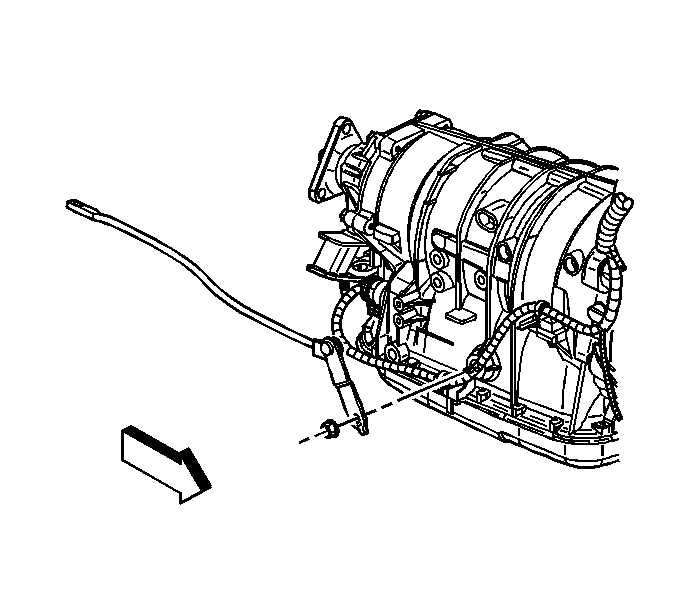


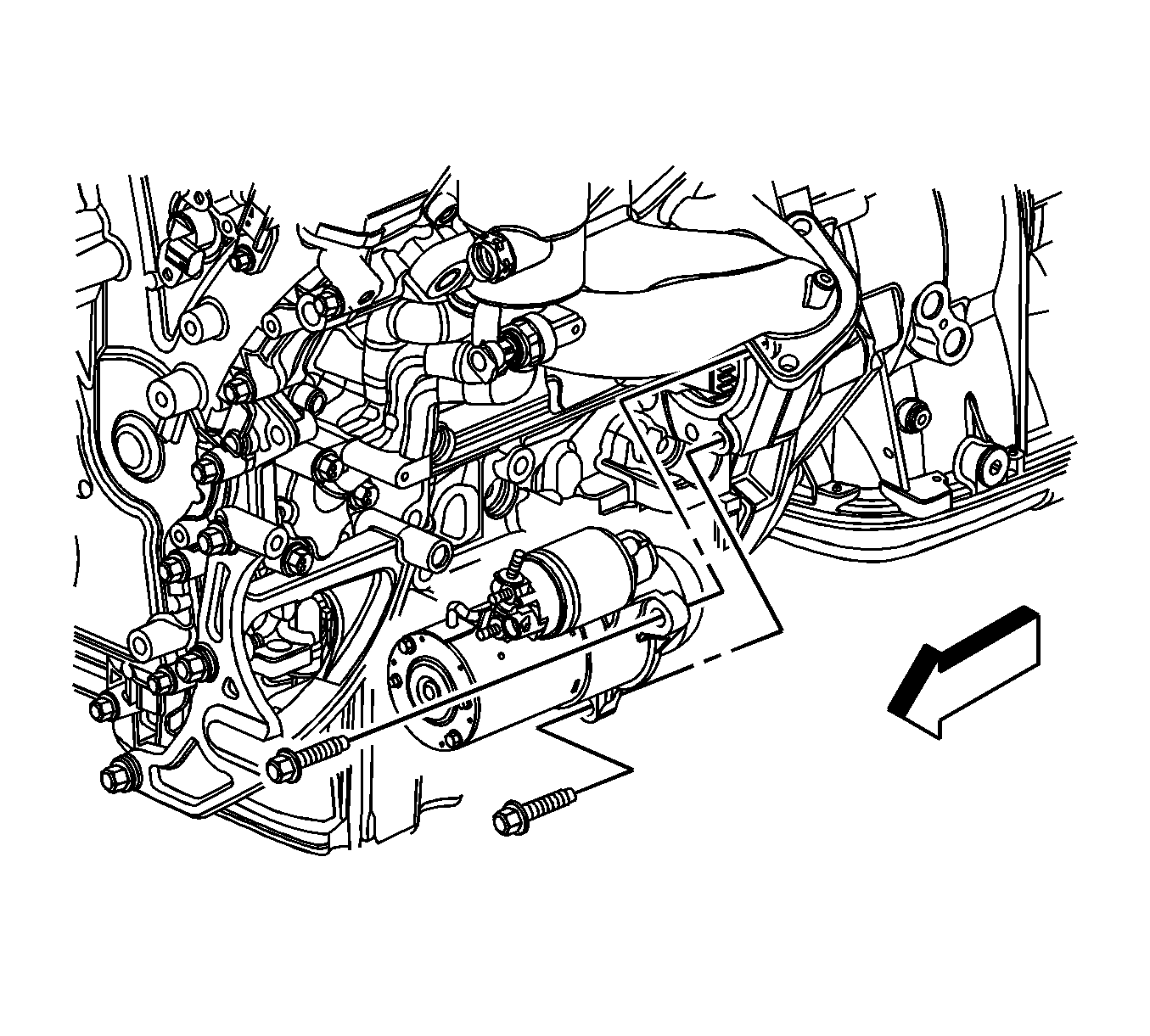
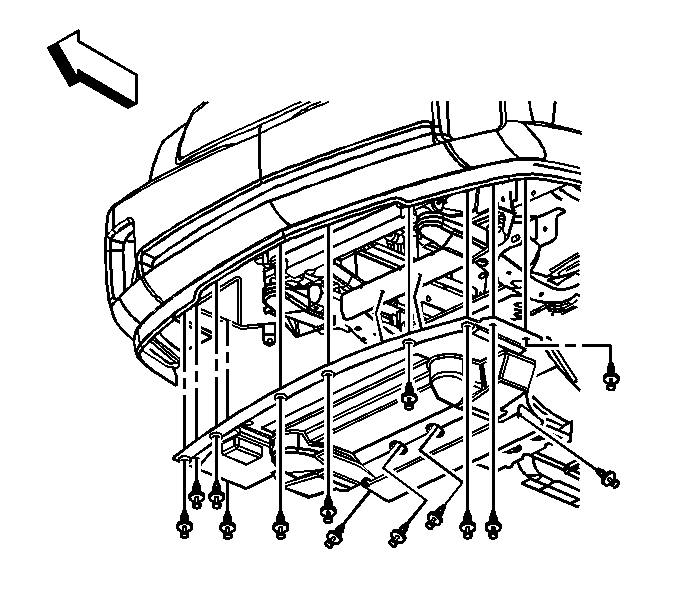
| 18.1. | Rotate the harmonic balancer center bolt or fan adapter, depending on the application, clockwise ONLY, in order to align the torque converter bolt with the access hole. |
| 18.2. | Remove and discard the torque converter bolt. The bolt is self locking and is NOT reusable. |


Important: Be careful to NOT allow the front differential drive pinion flange, if equipped, to come in contract with power steering rack while lowering the transmission.


Important: Ensure clearance is maintained between the transmission and the following:
• The starter drive nose cone • The catalytic converters • The oxygen sensors • The wiring harnesses • The cooler pipes
Installation Procedure
- Using the transmission jack, carefully raise the transmission to meet the engine.
- Align the transmission with the engine dowels (1).
- Install the lower 8 transmission mounting bolts.
- Remove the support stand from under the engine oil pan.
- Using the transmission jack. Lower the engine and transmission assembly only enough to gain access to the upper transmission bolt locations.
- Install the upper transmission mounting bolts.
- Position the engine wiring harness to the original location.
- Install the transfer case if equipped. Refer to Transfer Case Assembly Replacement in Transfer Case - BW 4476.
- Align the torque converter to flexplate/flywheel orientation marks made during the removal procedure.
- Complete the following steps for all 3 torque converter bolts:
- Install the starter motor. Refer to Starter Motor Replacement in Engine Electrical.
- Install the front air deflector. Refer to Front Air Deflector Replacement in Body Front End.
- Place NEW O-rings over the transmission fluid cooler pipes.
- Install the transmission fluid cooler pipes to the transmission. Refer to Transmission Fluid Cooler Pipe Replacement - Rear .
- Clip the transmission fluid cooler lines into the plastic cooler line retainer bracket.
- Install the front differential heat shield and bracket, if equipped. Refer to Shield Replacement in Front Drive Axle.
- Connect the wiring harness retainers to the transmission.
- Connect the transmission wiring harness connector (1) to the transmission by rotating the locking latch clockwise.
- Connect the shift linkage to the transmission. Refer to Shift Control Linkage Replacement .
- Install the rear propeller shaft. Refer to Rear Propeller Shaft Replacement in Propeller Shaft.
- Install the exhaust system. Refer to Exhaust System Replacement in Engine Exhaust.
- Install the thermostat housing. Refer to Engine Coolant Thermostat Housing Replacement in Engine Cooling.
- Connect the negative battery cable. Refer to Battery Negative Cable Disconnection and Connection in Engine Electrical.
- Check the transmission fluid level and fill if necessary. Refer to Transmission Fluid Check .
- Adjust the shift control linkage. Refer to Shift Control Linkage Adjustment .
- Lower the vehicle.
Important: Ensure clearance is maintained between the transmission and the following:
• The catalytic converters • The oxygen sensors • The wiring harnesses • The cooler pipes

Notice: Refer to Fastener Notice in the Preface section.
Tighten
| • | Tighten the M10 x 1.5 bolts to 50 N·m (37 lb ft). |
| • | Tighten the M12 x 1.75 bolts to 75 N·m (55 lb ft). |

Important: Be careful to NOT allow the front differential drive pinion flange, if equipped, to come in contract with power steering rack while lowering the transmission.
Tighten
| • | Tighten the M10 x 1.5 bolts to 50 N·m (37 lb ft). |
| • | Tighten the M12 x 1.75 bolts to 75 N·m (55 lb ft). |
Important: Torque converter bolts are self locking and must be replaced with NEW torque converter bolts every time the bolts are removed.
| 10.1. | Rotate the harmonic balancer center bolt or the fan adapter, depending on the application, clockwise ONLY, in order to align the torque converter bolt holes in the flexplate/flywheel with the access hole in the engine block. |
| 10.2. | To aid in alignment of the torque converter to the flexplate/flywheel. Install all 3 NEW torque converter bolts before fully tightening. |
Tighten
Tighten the torque converter bolts to 63 N·m (46 lb ft).






Transmission Final Test and Inspection
Complete the following procedure after the transmission is installed in the vehicle:
- With the ignition OFF or disconnected, crank the engine several times. Listen for any unusual noises or evidence that any parts are binding.
- Start the engine and listen for abnormal conditions.
- While the engine continues to idle, raise and support the vehicle. Refer to Lifting and Jacking the Vehicle in General Information.
- Inspect for fluid leaks while the engine is idling.
- Perform a final inspection for the proper fluid level.
- Lower the vehicle.
- Reset the TAP values. Refer to Transmission Adaptive Functions .
- Road test the vehicle.
Important: It is recommended that transmission adaptive pressure (TAP) information be reset.
Resetting the TAP values using a scan tool will erase all learned values in all cells. As a result, the engine control module (ECM), powertrain control module (PCM) or transmission control module (TCM) will need to relearn TAP values. Transmission performance may be affected as new TAP values are learned.